- Home
- Alexandre Dumas
Une fille du régent. English Page 8
Une fille du régent. English Read online
Page 8
CHAPTER VII.
A SERVANT IN THE ROYAL LIVERY.--MONSEIGNEUR LE DUC D'ORLEANS.
While the things which we have related were passing in the parlor of thehotel Tigre-Royal, in another apartment of the same hotel, seated near alarge fire, was a man shaking the snow from his boots, and untying thestrings of a large portfolio. This man was dressed in the hunting liveryof the house of Orleans; the coat red and silver, large boots, and athree-cornered hat, trimmed with silver. He had a quick eye, a longpointed nose, a round and open forehead, which was contradicted by thinand compressed lips.
This man murmured to himself some phrases which he interrupted by oathsand exclamations, which seemed less the result of words than thoughts.
"Come, come," said he, "M. de Montaran did not deceive me, and ourBretons are hard at the work; but for what earthly reason can he havecome by such short stages? He left at noon on the 11th, and only arrivedon the evening of the 21st. This probably hides some new mystery, whichwill be explained by the fellow recommended by Montaran, and with whommy people were in communication on the journey. Hola!"
And he rang a silver bell. A man, dressed in gray, like those we haveseen on the route, appeared.
"Ah! it is you, Tapin?"
"Yes, monseigneur; the affair being important, I thought it better tocome myself."
"Have you questioned the men you placed on the road?"
"Yes, monseigneur; but they know nothing but the places at which ourconspirators stopped; in fact, that is all they were told to learn."
"I will try to learn from the servant. What sort of man is he?"
"Oh, a mischievous simpleton, half Norman, half Breton; a bad fellow."
"What is he about now?"
"Serving his master's supper."
"Whom, I hope, they have placed as I desired?"
"Yes, monseigneur."
"In a room without curtains?"
"Yes, monseigneur."
"And you have made a hole in the shutter?"
"Yes, monseigneur."
"Well, then, send me the servant, and remain within call."
The man in the red coat consulted his watch.
"Half-past eight," said he; "at this hour Monseigneur the Regent returnsto St. Germains and asks for Dubois; as Dubois is not there, he rubshis hands and prepares for some folly. Rub your hands, Philipped'Orleans, and amuse yourself at your pleasure, for the danger is not atParis, but here. We shall see if you will laugh at my secret police thistime. Ah! here is our man."
At this moment Tapin introduced Owen.
"Here is the person you wished to see," said he.
Owen remained standing, trembling, near the door, while Dubois wrappedhimself in a large cloak, which left only the upper part of his facevisible to him on whom he fixed his cat-like eyes.
"Approach, my friend," said Dubois.
In spite of the cordiality of this invitation, it was given in so harsha voice that Owen would have preferred being at a greater distance fromthis man, who looked at him so strangely.
"Well, fellow," said Dubois, seeing that he did not stir, "did you nothear me?"
"Yes, monseigneur," said Owen.
"Then why do you not obey?"
"I did not know you spoke to me."
And Owen then stepped forward.
"You have received fifty louis to speak the truth to me," continuedDubois.
"Pardon, monseigneur," said Owen, who began to recover his composure; "Ihave not received them; they were promised to me, but--"
Dubois took a handful of gold from his pocket, counted fifty louis, andplaced them in a pile on the table.
Owen looked at the pile with an expression of which one would havesupposed his dull countenance incapable.
"Good," thought Dubois; "he is avaricious."
In reality, the fifty louis had always appeared very doubtful to Owen.He had betrayed his master with scarcely a hope of obtaining his reward;and now the promised gold was before his eyes.
"May I take them?" asked Owen, spreading his hand toward them.
"Wait a moment," said Dubois, who amused himself by exciting thatcupidity which any but a peasant would have concealed; "we will make abargain."
"What is it?" asked Owen.
"Here are the fifty louis."
"I see them," said Owen, passing his tongue over his lips, like athirsty dog.
"At every answer you make to a question of mine, I either add ten louisif it is important, or take them away if it is unimportant and stupid."
Owen started; he did not like the terms.
"Now," said Dubois, "let us talk. What place have you come from?"
"Direct from Nantes."
"With whom?"
"With the Chevalier Gaston de Chanlay."
These being preliminary questions, the pile remained undisturbed.
"Listen!" said Dubois.
"I am all attention."
"Did your master travel under his own name?"
"He set out in his own name, but changed it on the journey."
"What name did he take?"
"M. de Livry."
Dubois added ten louis, but as they would not stand on the others, hecommenced a second pile.
Owen uttered a joyful cry.
"Oh," said Dubois, "do not exult yet. We are not near the end. Is therea M. de Livry at Nantes?"
"No, monseigneur; but there is a Demoiselle de Livry."
"Who is she?"
"The wife of M. de Montlouis, an intimate friend of my master."
"Good," said Dubois, adding ten louis; "and what was your master doingat Nantes?"
"What most young men do; he hunted, danced, and so on."
Dubois took away ten louis. Owen shuddered.
"Stop," said he, "he did something else."
"Ah! what was that?"
"I do not know," replied Owen.
Dubois held the ten louis in his hand.
"And since his departure, what has he done?"
"He passed through Oudon, Ancenis, Le Mans, Nogent, and Chartres."
Dubois stretched out his hand, and took up another ten louis.
Owen uttered a dolorous cry.
"And did he make no acquaintance on the route?"
"Yes; with a young lady from the Augustine convent at Clisson, who wastraveling with a sister of the convent, named Therese."
"And what was the young lady called?"
"Mademoiselle Helene de Chaverny."
"Helene! A promising name. Doubtless, she is your master's mistress?"
"I do not know," said Owen; "he would not have told me."
"He is a shrewd fellow," said Dubois, taking ten louis from the fifty.
Owen trembled: four such answers, and he would have betrayed his masterfor nothing.
"And these ladies are going to Paris with him?"
"No, monseigneur; they stop at Rambouillet."
"Ah," said Dubois.
The tone of this exclamation gave Owen some hope.
"Come," said Dubois, "all this is not very important, but one mustencourage beginners."
And he added ten louis to the pile.
"Sister Therese," continued Owen, "is already gone home."
"So that the young lady remains alone?"
"No," answered Owen.
"How so?"
"A lady from Paris awaited her."
"From Paris?"
"Yes."
"Do you know her name?"
"I heard Sister Therese call her Madame Desroches."
"Madame Desroches!" cried Dubois, and he began another pile with tenlouis.
"Yes," replied Owen, delighted.
"Are you sure?"
"Of course I am; she is a tall, thin, yellow-looking woman."
Dubois added ten louis. Owen thought that if he had made an intervalbetween each adjective he might have had twenty louis.
"Thin, tall, yellow," repeated Dubois; "just so."
"From forty to forty-five," added Owen.
"Exactly," sa
id Dubois, adding ten louis.
"In a silk dress, with large flowers on it."
"Very good," said Dubois.
Owen saw that his questioner knew enough about the lady, and waited.
"And you say that your master made acquaintance with the young lady enroute?"
"Yes, monsieur, but I think it was a farce."
"What do you mean?"
"I mean that they knew each other before; and I am sure of one thing,that my master waited for her three hours at Oudon."
"Bravo," said Dubois, adding ten louis; "we shall make something ofyou."
"You do not wish to know anything more, then?" asked Owen, extending hishand toward the two piles of gold.
"Stop," said Dubois; "is the young lady pretty?"
"Beautiful as an angel," answered Owen.
"And, no doubt, they made an appointment to meet in Paris?"
"No, monsieur, I think they said adieu forever."
"Another farce."
"I do not think so, monsieur; my master was so sad when they separated."
"And they are not to meet again?"
"Yes, once more, I think, and all will be over."
"Well, take your money; and remember that if you mention one word ofthis, in ten minutes you will be a dead man."
Owen snatched the money, which disappeared in his pocket instantly.
"And now," said he, "may I go?"
"No, idiot; from this moment you belong to me, for I have bought you,and you will be more useful to me at Paris than elsewhere."
"In that case I will remain, monsieur, I promise."
"There is no need to promise."
At this moment the door opened, and Tapin appeared, looking very muchagitated.
"What has happened now?" asked Dubois.
"Something very important, monseigneur; but send away this man."
"Return to your master," said Dubois, "and if he writes to any onewhatever, remember that I am most anxious to see his writing."
Owen went out, delighted to be set free.
"Well, Tapin," said Dubois, "what is it?"
"Monseigneur, after the hunt at St. Germains, his royal highness,instead of returning to Paris, sent away every one, and gave orders toproceed to Rambouillet."
"The regent coming to Rambouillet!"
"He will be here in half an hour, and would have been here now, ifhunger had not luckily obliged him to enter the chateau and procure somerefreshment."
"And what is he coming to Rambouillet for?"
"I do not know, monseigneur, unless it be for the young girl who hasjust arrived with a nun, and who is now in the pavilion of the hotel."
"You are right, Tapin; it is doubtless for her; and Madame Desroches,too. Did you know that Madame Desroches was here?"
"No, monseigneur, I did not."
"And are you sure that your information is correct, my dear Tapin?"
"Oh, monseigneur, it was from L'Eveille, whom I placed near his royalhighness, and what he says is gospel truth."
"You are right," said Dubois, who seemed to know the qualities of thisman, "if it be L'Eveille, there is no doubt."
"The poor fellow has lamed his horse, which fell near Rambouillet."
"Thirty louis for the horse; he may gain what he can of it."
Tapin took the thirty louis.
"You know the situation of the pavilion, do you not?"
"Perfectly."
"Where is it?"
"One side looks on the second courtyard; the other on a deserted lane."
"Place men in the courtyard and in the lane, disguised as stablemen, orhow you please; let no one enter the pavilion but monseigneur andmyself; the life of his royal highness is at stake."
"Rest easy, monseigneur."
"Do you know our Breton?"
"I saw him dismount."
"Do your men know him?"
"They all saw him on the road."
"Well, I recommend him to you."
"Shall we arrest him?"
"Certainly not; he must be allowed to go where he pleases, and act as hepleases, and he must have every opportunity to do so. If he werearrested now, he would tell nothing, and our plans would bedisconcerted; no, no, these plans must hatch."
"Hatch what, monseigneur?" said Tapin, who appeared to be onconfidential terms with Dubois.
"My archbishop's miter, M. Lecocq," said Dubois, "and now to your work;I go to mine."
Both left the room and descended the staircase, but separated at thedoor; Lecocq went along the Rue de Paris; and Dubois, slipping along bythe wall, went to peep through the hole in the shutter.

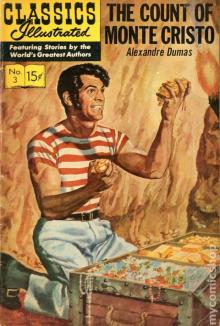 The Count of Monte Cristo, Illustrated
The Count of Monte Cristo, Illustrated Knight of Maison-Rouge
Knight of Maison-Rouge![The Three Musketeers - Alexandre Dumas - [Full Version] - (ANNOTATED) Read online](http://i1.bookreadfree.com/14/the_three_musketeers_-_alexandre_dumas_-_[full_version]_-_annotated_preview.jpg) The Three Musketeers - Alexandre Dumas - [Full Version] - (ANNOTATED)
The Three Musketeers - Alexandre Dumas - [Full Version] - (ANNOTATED)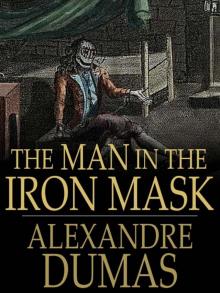 The Man in the Iron Mask
The Man in the Iron Mask The Count of Monte Cristo (Penguin Classics eBook)
The Count of Monte Cristo (Penguin Classics eBook) Count of Monte Cristo (abridged) (Barnes & Noble Classics Series)
Count of Monte Cristo (abridged) (Barnes & Noble Classics Series) The Women's War
The Women's War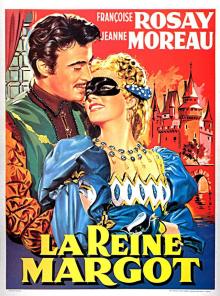 La reine Margot. English
La reine Margot. English The Vicomte de Bragelonne
The Vicomte de Bragelonne__english_preview.jpg) La dame aux camélias (Novel). English
La dame aux camélias (Novel). English The Count of Monte Cristo
The Count of Monte Cristo Balsamo, the Magician; or, The Memoirs of a Physician
Balsamo, the Magician; or, The Memoirs of a Physician Ten Years Later
Ten Years Later The Romance of Violette
The Romance of Violette The Mesmerist's Victim
The Mesmerist's Victim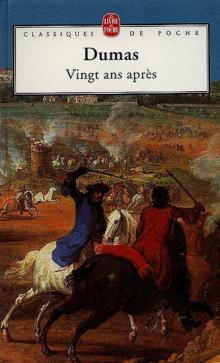 Vingt ans après. English
Vingt ans après. English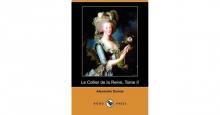 Le collier de la reine. English
Le collier de la reine. English Taking the Bastile; Or, Pitou the Peasant
Taking the Bastile; Or, Pitou the Peasant The Hero of the People: A Historical Romance of Love, Liberty and Loyalty
The Hero of the People: A Historical Romance of Love, Liberty and Loyalty Louise de la Valliere
Louise de la Valliere Les Quarante-cinq. English
Les Quarante-cinq. English Ange Pitou (Volume 1)
Ange Pitou (Volume 1) The Royal Life Guard; or, the flight of the royal family.
The Royal Life Guard; or, the flight of the royal family.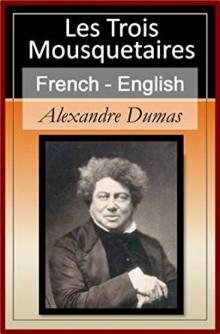 Les trois mousquetaires. English
Les trois mousquetaires. English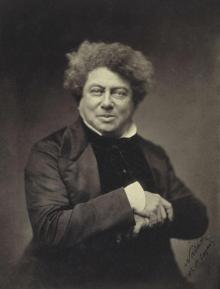 Une fille du régent. English
Une fille du régent. English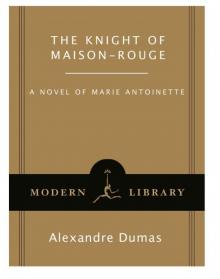 The Knight of Maison-Rouge
The Knight of Maison-Rouge The Count of Monte Cristo (Unabridged Penguin)
The Count of Monte Cristo (Unabridged Penguin) Ange Pitou
Ange Pitou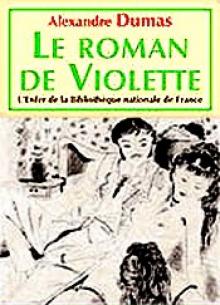 The Romance of Violette (vintage erotica)
The Romance of Violette (vintage erotica) The Three Musketeers
The Three Musketeers Three Musketeers (Barnes & Noble Classics Series)
Three Musketeers (Barnes & Noble Classics Series) Georges
Georges Man in the Iron Mask (Barnes & Noble Classics Series)
Man in the Iron Mask (Barnes & Noble Classics Series) The Red Sphinx
The Red Sphinx